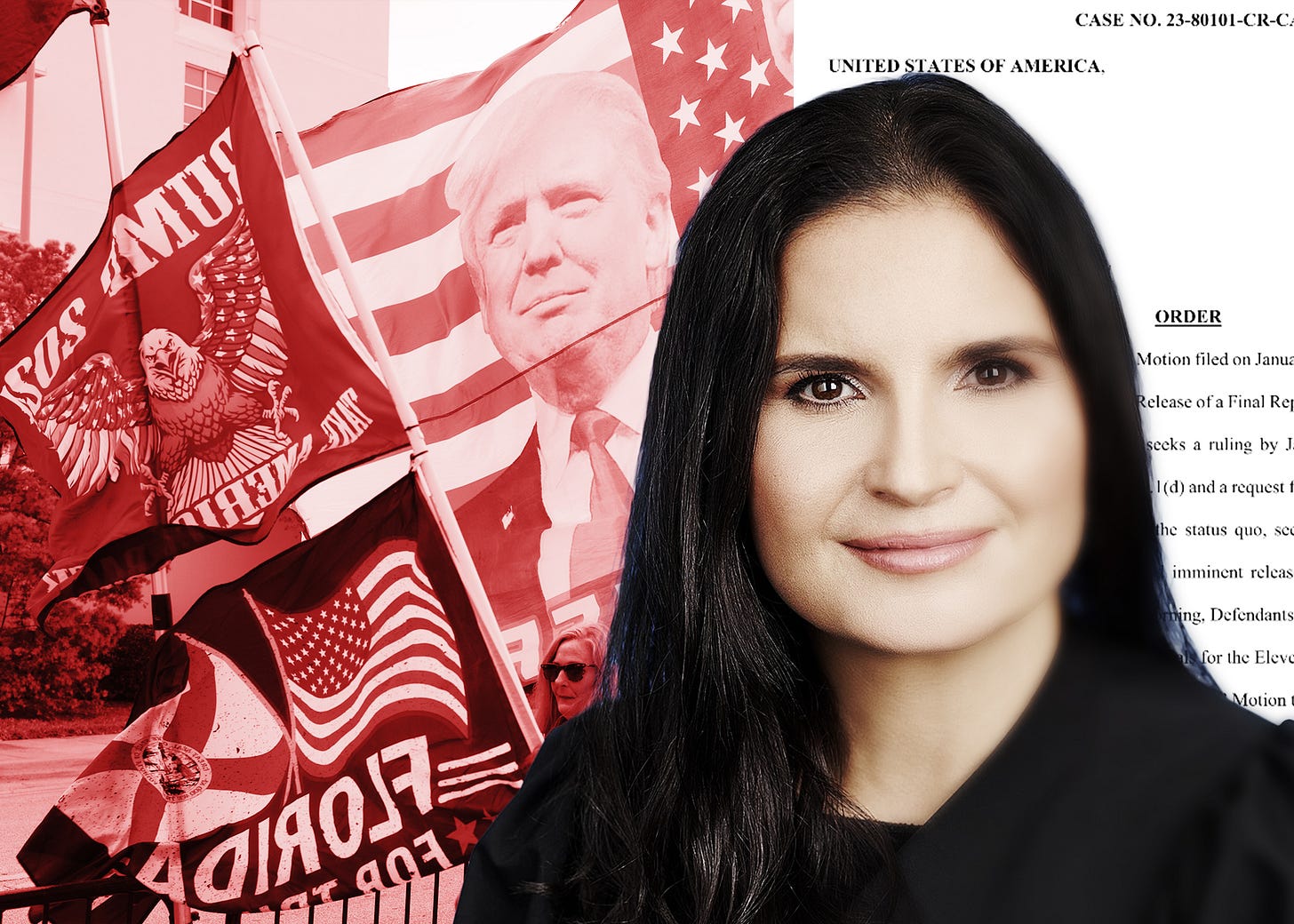Trump’s Favorite Judge Scrambles to Block Jack Smith’s Final Report
Aileen Cannon is apparently so desperate to signal her loyalty to Trump that she’s flailing about where she has no jurisdiction.
ON TUESDAY, U.S. DISTRICT JUDGE AILEEN CANNON once again handed Donald J. Trump a legal win that’s only tangentially tethered to actual law. In response to an emergency motion filed by Trump’s co-defendants in the Mar-a-Lago classified documents case (Waltine Nauta and Carlos De Oliveira), Judge Cannon issued an order preventing Special Counsel Jack Smith’s release of his final report in order “to preserve the status quo.” In all likelihood, this portends yet another checkmate on the rule of law.
Cannon acknowledges that Nauta and De Oliveira (who were caught on surveillance cameras moving boxes of classified records around Mar-a-Lago, presumably at Trump’s direction) filed an identical motion in the Court of Appeals for the Eleventh Circuit—which is essentially Cannon’s immediate boss. Her decision to jump in when the appeals court already has it covered signals bias, which on her part is already well-established.
Moreover, the underlying criminal indictment—which Cannon threw out on the ridiculous theory that Special Jack Smith’s appointment (and by that logic, the appointment of every other special counsel, including the ones who investigated Hunter Biden and the Mueller investigation prosecutors) is unconstitutional—is already on appeal to the Eleventh Circuit. What that means is that jurisdiction over the case is no longer with Cannon. It was transferred to the appeals court, so she has no power over the report. Although there are exceptions to the rule that jurisdiction lies in only one court at a time, Cannon doesn’t bother to cite any authority justifying her three-page order ignoring the general rule. Given that the Eleventh Circuit will decide this matter anyway, her intervention appears designed more than anything else to send a message of loyalty to the president-elect.
Cannon’s order also fails to grapple with the Justice Department regulations governing special counsels, which give the attorney general—and not a judge—the authority to decide whether any portion of the report should be released to the public. Without comprehensive briefing around the constitutionality of that portion of the regulations, Cannon’s cavalier snub of Merrick Garland’s authority is a troubling intrusion into the separation of powers.
One might think that Trump’s lawyers offered the legal heft needed to justify such a move. One would be wrong. Todd Blanche, Trump’s pick for deputy attorney general, and Emil Bove, who joined Blanche in unsuccessfully defending Trump in the Manhattan hush money trial, filed a motion asking Cannon to allow Trump to participate as an amicus in his co-defendants’ request for a stay of the Smith report. In that brief, they bizarrely refer to “private citizen, and so-called Special Counsel, Jack Smith” as having “no basis . . . to be spending tax dollars to interfere with the Presidential transition process by making false and presidential claims about President Trump.” They cite Cannon’s order dismissing the indictment as the authority for her to use in stopping release of the report. This is circular reasoning at its dumbest.
THE END GAME HERE IS, as it has ever been, delay. All Trump needs is for the courts to glom up the gears for a dozen more days. Once he has been inaugurated, Smith’s report will meet its fate in the dustbin of history, where it will stay for generations—if not forever. If the Eleventh Circuit sides with DOJ, Trump will appeal to his sympathetic Supreme Court majority. If they take the case, there is no way it will be resolved before January 20, putting the justices in the untenable position of knowing that if they later greenlight the report’s release, Trump could just refuse to abide by their ruling.
Jack Smith and Merrick Garland should do whatever they can to get Smith’s final report (or reports) published as quickly as possible. And if there’s any risk that Trump might attempt to go after Smith and Garland for disobeying Cannon’s order, seeking to hold them in contempt of court, President Joe Biden should pardon them preemptively.
Arguably, since the president is the attorney general’s boss, and since the requirement that a special counsel’s report go to the attorney general is a matter of regulation rather than legislation, Biden could decide to put out the report himself. If Cannon balked at this, it wouldn’t make any difference: The report would already be public and the action would constitute an exercise of a “core” official power and thus Biden would be immune from any legal accountability under Trump v. U.S., the Supreme Court’s ruling creating presidential criminal immunity.
The bottom line: Trump is days from assuming the presidency. Time is of the essence. For the sake of the historical record, and in the name of truth and decency, Trump must not be allowed to toss these prosecutions into the memory hole.




